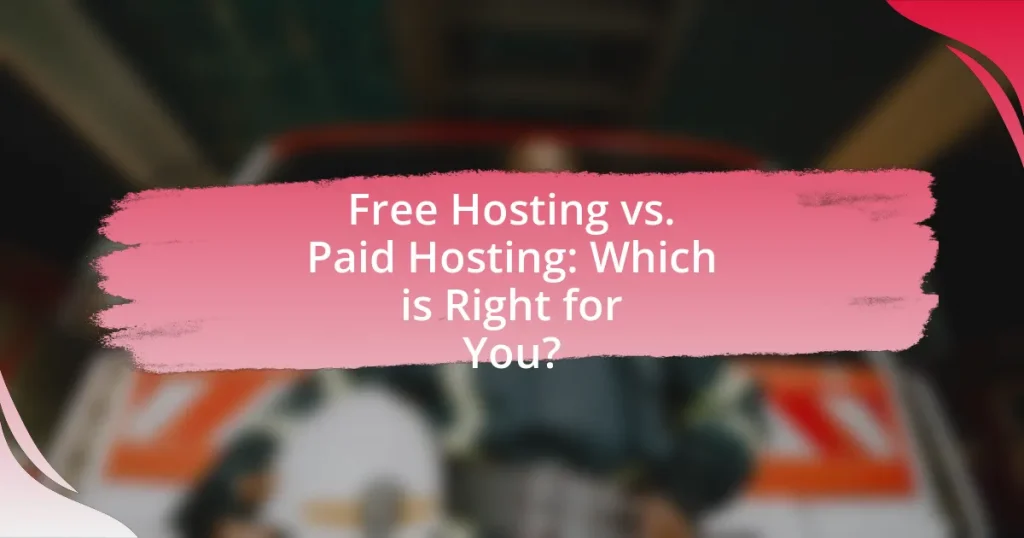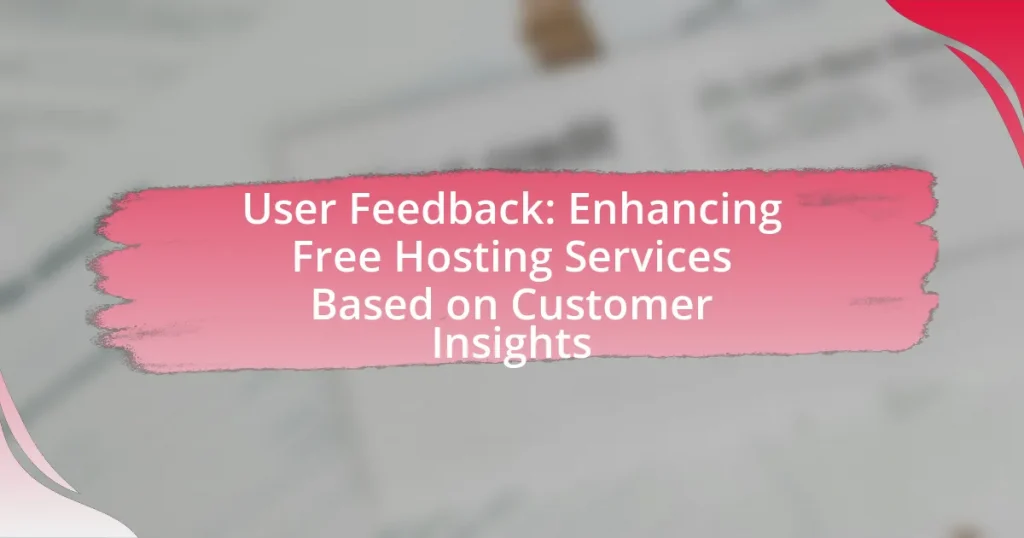The article examines the differences between free hosting and paid hosting, highlighting their respective features, advantages, and limitations. Free hosting offers a cost-effective solution with basic functionalities but often lacks reliability, support, and essential features, making it suitable for personal projects or beginners. In contrast, paid hosting provides enhanced performance, security, and customer support, making it a more viable option for businesses and serious website owners. The article also discusses factors to consider when choosing between the two options, including website needs, expected traffic, and budget considerations, as well as common misconceptions surrounding both hosting types.
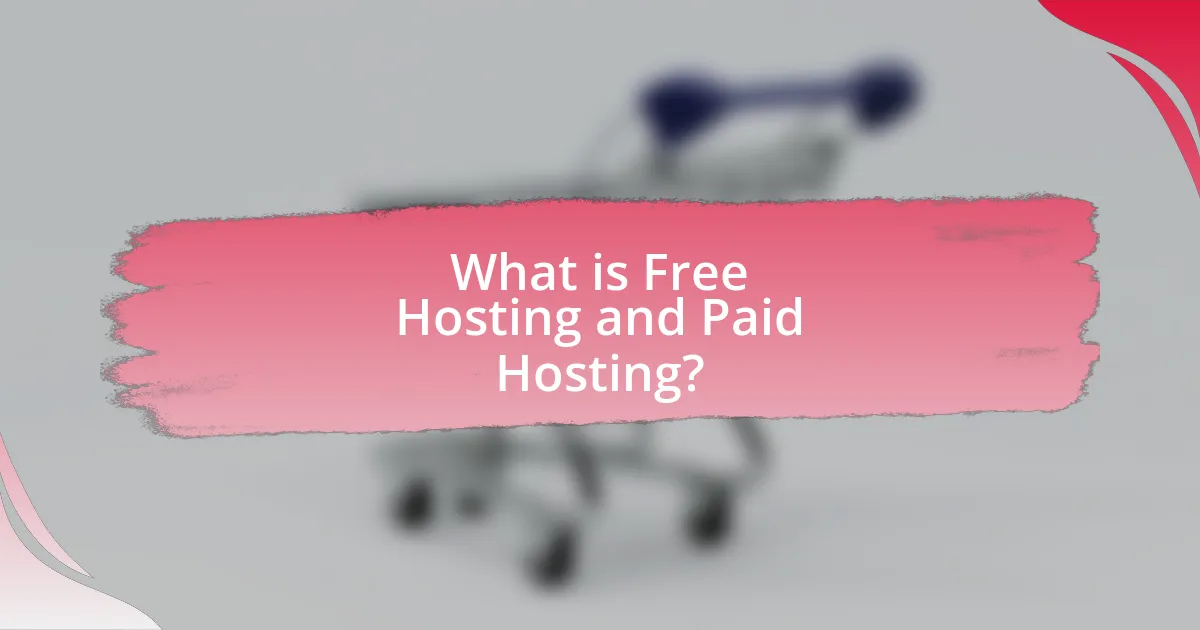
What is Free Hosting and Paid Hosting?
Free hosting is a service that allows users to host their websites without any financial cost, typically funded by advertisements or limited features. In contrast, paid hosting requires users to pay a fee for enhanced services, including better performance, customer support, and additional features. According to a 2023 survey by HostingAdvice, 70% of users prefer paid hosting for its reliability and speed, highlighting the trade-offs between cost and quality in web hosting options.
How do Free Hosting and Paid Hosting differ?
Free hosting and paid hosting differ primarily in terms of features, reliability, and support. Free hosting typically offers limited storage, bandwidth, and lacks customer support, while paid hosting provides more resources, enhanced performance, and dedicated technical assistance. For instance, free hosting services often display ads on websites and may impose restrictions on website functionality, whereas paid hosting allows for greater customization and control over the hosting environment. Additionally, paid hosting services generally ensure higher uptime rates and better security measures, making them more suitable for businesses and professional websites.
What are the key features of Free Hosting?
Free hosting typically offers features such as limited storage space, bandwidth restrictions, and basic customer support. These services often include a subdomain instead of a custom domain, which can affect branding. Additionally, free hosting may display advertisements on user websites, and users often have limited control over server configurations. According to a survey by HostingAdvice, 70% of users reported that free hosting services lack essential features compared to paid options, highlighting the trade-offs involved.
What are the key features of Paid Hosting?
Paid hosting offers several key features that distinguish it from free hosting options. These features include enhanced performance, such as faster loading times and increased uptime, which are critical for maintaining a professional online presence. Additionally, paid hosting typically provides greater storage capacity and bandwidth, allowing for more extensive websites and higher traffic volumes without performance degradation.
Security is another significant feature, as paid hosting services often include advanced security measures like SSL certificates, regular backups, and malware protection, which are essential for safeguarding sensitive data. Furthermore, paid hosting usually comes with dedicated customer support, offering assistance through various channels, including live chat and phone support, ensuring that users can resolve issues promptly.
Lastly, paid hosting often allows for greater customization and control over server settings, enabling users to tailor their hosting environment to meet specific needs. These features collectively make paid hosting a more reliable and robust option for individuals and businesses looking to establish a strong online presence.
Why do people choose Free Hosting?
People choose free hosting primarily due to its cost-effectiveness, allowing individuals and small businesses to establish an online presence without financial investment. This option is particularly appealing for those testing ideas, learning web development, or operating on a limited budget. According to a survey by HostingAdvice, 70% of users indicated that the lack of financial commitment was a significant factor in their choice of free hosting services. Additionally, free hosting often provides essential features like website builders and basic storage, making it accessible for beginners.
What are the advantages of using Free Hosting?
Free hosting offers several advantages, primarily cost savings, as it allows users to create and maintain a website without any financial investment. This is particularly beneficial for individuals or small businesses with limited budgets, enabling them to establish an online presence without incurring expenses. Additionally, free hosting services often provide user-friendly interfaces and basic features that simplify website creation for beginners, making it accessible for those without technical expertise. Furthermore, many free hosting platforms include built-in tools for website management and analytics, which can help users track performance and optimize their sites effectively.
What limitations come with Free Hosting?
Free hosting typically comes with several limitations, including restricted storage space, limited bandwidth, and lack of customer support. These constraints can hinder website performance and scalability, as many free hosting services impose caps on the amount of data that can be stored and transferred. Additionally, free hosting often includes mandatory advertisements, which can detract from the user experience and brand image. Security features are usually minimal or non-existent, increasing vulnerability to cyber threats. According to a study by HostingAdvice, 70% of users reported dissatisfaction with the performance of free hosting services, highlighting the common issues faced by users in this category.
What are the reasons to opt for Paid Hosting?
Paid hosting offers enhanced performance, reliability, and support compared to free hosting. Users benefit from faster loading times due to dedicated resources, which can improve user experience and SEO rankings. Paid hosting typically includes a higher level of security, protecting websites from malware and hacking attempts, which is crucial for maintaining data integrity. Additionally, paid hosting services often provide customer support, ensuring that technical issues can be resolved promptly, which is not always available with free hosting options. Furthermore, paid hosting allows for greater customization and scalability, accommodating growing website needs without significant limitations. These factors collectively make paid hosting a more viable option for businesses and serious website owners.
What benefits does Paid Hosting provide?
Paid hosting provides enhanced performance, reliability, and customer support compared to free hosting options. Users benefit from faster loading times due to dedicated resources, which can improve user experience and SEO rankings. Additionally, paid hosting typically includes a higher level of security features, such as SSL certificates and regular backups, which protect websites from data breaches and loss. Furthermore, paid hosting services often offer 24/7 customer support, ensuring that technical issues can be resolved promptly, which is crucial for maintaining website uptime and functionality.
How does Paid Hosting address the limitations of Free Hosting?
Paid hosting addresses the limitations of free hosting by offering enhanced resources, reliability, and support. Unlike free hosting, which often imposes bandwidth and storage limits, paid hosting provides scalable options that accommodate growing websites. Additionally, paid hosting typically includes a custom domain name, which enhances branding and professionalism, while free hosting often requires subdomains that can diminish credibility. Furthermore, paid hosting services generally offer better security features, such as SSL certificates and regular backups, which are often lacking in free hosting. This increased security is crucial for protecting sensitive data and maintaining user trust. Lastly, paid hosting usually comes with dedicated customer support, ensuring that users can resolve issues promptly, a service often unavailable with free hosting options.
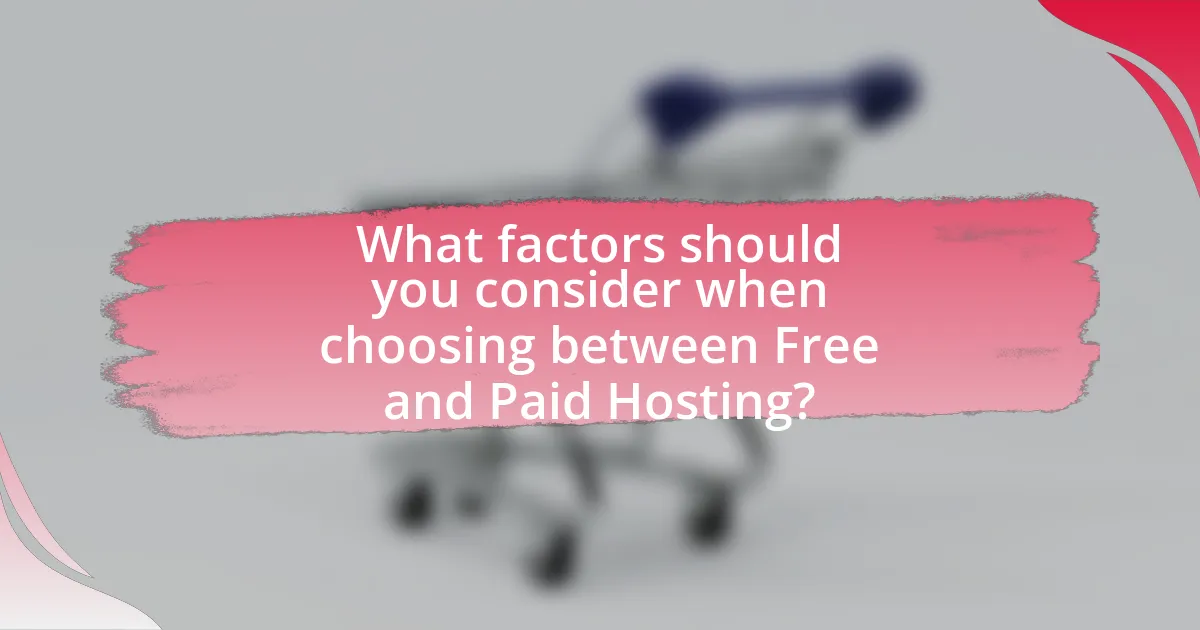
What factors should you consider when choosing between Free and Paid Hosting?
When choosing between Free and Paid Hosting, consider factors such as reliability, support, features, and scalability. Free hosting often lacks reliability due to limited resources and may include ads, while paid hosting typically offers better uptime and performance. Support is crucial; paid hosting usually provides 24/7 customer service, whereas free options may have minimal or no support. Features like storage space, bandwidth, and security measures are often more robust in paid plans, making them suitable for growing websites. Scalability is another important factor; paid hosting allows for easy upgrades as your site grows, while free hosting may restrict your ability to expand.
How do your website needs influence your hosting choice?
Your website needs significantly influence your hosting choice by determining the type of resources, performance, and support required. For instance, a website with high traffic demands robust server capabilities and bandwidth, which are typically offered by paid hosting services. In contrast, a personal blog with low traffic may suffice with free hosting options. Additionally, specific features such as e-commerce functionality or advanced security measures necessitate paid hosting, as free options often lack these critical components. According to a study by HostingAdvice, 70% of businesses reported improved performance and reliability after switching from free to paid hosting, underscoring the importance of aligning hosting choices with website requirements.
What type of website are you planning to host?
I am planning to host a personal blog. Personal blogs typically require minimal resources and can benefit from both free and paid hosting options, depending on the desired features and scalability. Free hosting services often provide basic functionalities suitable for personal expression, while paid hosting offers enhanced performance, customization, and support, which can be crucial for growing an audience.
What level of traffic do you expect?
I expect moderate to high traffic levels for a website utilizing paid hosting, as it typically offers better performance, reliability, and scalability compared to free hosting options. Paid hosting services often provide resources that can handle increased visitor numbers, with many plans designed to support thousands of concurrent users. For instance, a study by HostingAdvice found that websites on paid hosting can experience up to 99.9% uptime, which is crucial for maintaining consistent traffic flow. In contrast, free hosting services often limit bandwidth and server resources, leading to potential downtimes and slower load times, which can negatively impact traffic levels.
What budget considerations should you keep in mind?
When considering a budget for hosting, you should evaluate both the initial costs and potential long-term expenses. Free hosting often has no upfront fees but may include hidden costs such as limited bandwidth, lack of customer support, and potential downtime, which can affect your website’s performance and reliability. In contrast, paid hosting typically involves monthly or annual fees but offers benefits like enhanced security, better performance, and customer support, which can save money in the long run by preventing issues that could disrupt your online presence. According to a study by HostingAdvice, businesses that invest in reliable paid hosting experience 99.9% uptime, significantly reducing the risk of lost revenue due to website outages.
How does the cost of Paid Hosting compare to Free Hosting?
Paid hosting typically incurs a monthly or annual fee, while free hosting does not require any payment. The cost of paid hosting can range from a few dollars to hundreds of dollars per month, depending on the features and resources provided. In contrast, free hosting often comes with limitations such as reduced storage, bandwidth restrictions, and the presence of advertisements. Additionally, paid hosting generally offers better customer support, enhanced security, and greater reliability, making it a more viable option for businesses and serious projects.
What hidden costs might arise with Free Hosting?
Hidden costs associated with free hosting include limited bandwidth, lack of customer support, and potential data loss. Free hosting services often impose restrictions on bandwidth, which can lead to additional charges if your website exceeds these limits. Additionally, the absence of reliable customer support can result in lost revenue during downtime, as issues may take longer to resolve. Furthermore, free hosting providers may not guarantee data backups, increasing the risk of data loss, which can incur significant costs if recovery is needed. These factors collectively highlight the potential financial implications of opting for free hosting services.
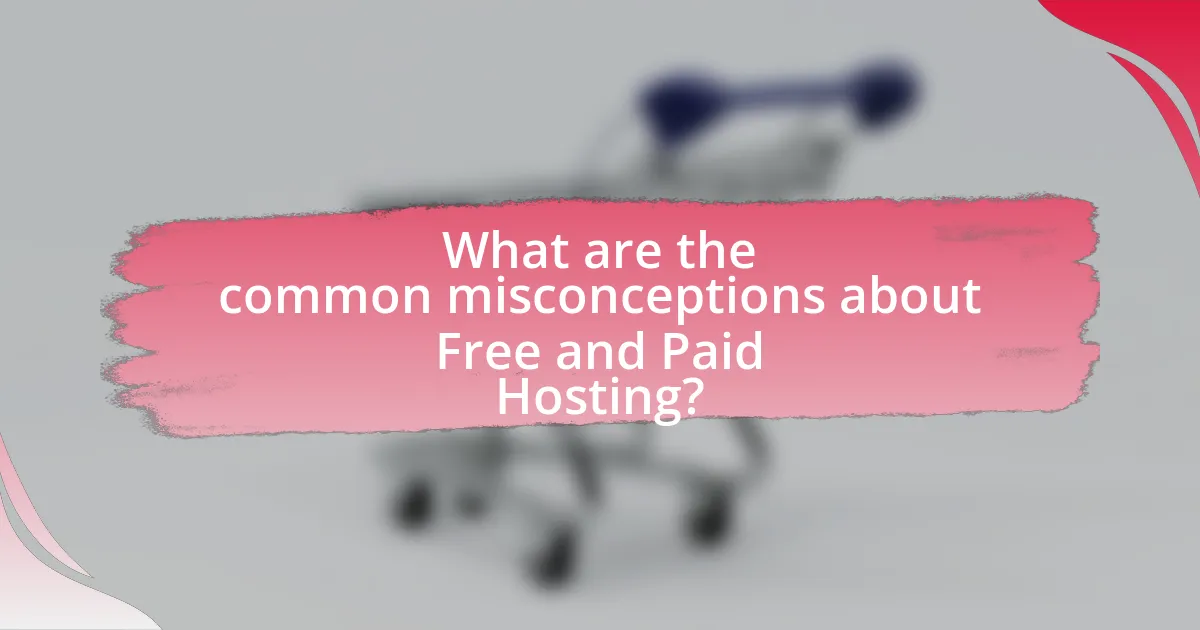
What are the common misconceptions about Free and Paid Hosting?
Common misconceptions about free and paid hosting include the belief that free hosting is entirely sufficient for professional use and that paid hosting guarantees superior performance without any drawbacks. Many users assume that free hosting offers adequate resources and reliability, but in reality, it often comes with limitations such as bandwidth restrictions, lack of customer support, and potential downtime. Conversely, while paid hosting typically provides better performance, users may overlook factors like the need for ongoing maintenance and the possibility of hidden fees. These misconceptions can lead to poor hosting choices that do not align with users’ needs.
Is Free Hosting always a bad choice?
Free hosting is not always a bad choice, as it can be suitable for specific use cases such as personal projects, testing, or small websites with low traffic. Many free hosting services offer basic features that can meet the needs of users who do not require advanced functionalities or high performance. For instance, platforms like WordPress.com and Wix provide free hosting options that allow users to create websites without upfront costs. However, these services often come with limitations, such as restricted bandwidth, storage, and the presence of ads, which may hinder scalability and professional appearance. Therefore, while free hosting can be beneficial in certain scenarios, it may not be ideal for businesses or larger projects that require reliability and support.
What scenarios might make Free Hosting a viable option?
Free hosting becomes a viable option in scenarios such as personal projects, small websites, or when testing new ideas. Individuals or small businesses with limited budgets often choose free hosting to minimize costs while establishing an online presence. For instance, a hobbyist may use free hosting to create a blog or portfolio without financial commitment. Additionally, startups may utilize free hosting to prototype their services before investing in paid options, allowing them to gauge interest and functionality without upfront expenses. These scenarios highlight the practicality of free hosting for users seeking low-risk solutions.
How can Free Hosting be beneficial for beginners?
Free hosting can be beneficial for beginners by providing a cost-effective way to learn web development and online presence management. It allows users to experiment with website creation, design, and functionality without financial risk. According to a survey by HostingAdvice, 70% of new website owners prefer free hosting to test their ideas before committing to paid services. This approach enables beginners to gain practical experience and understand their needs before investing in more advanced hosting solutions.
Are all Paid Hosting services the same?
No, all paid hosting services are not the same. Paid hosting services vary significantly in terms of features, performance, customer support, pricing, and scalability. For instance, some providers offer managed services that include automatic updates and backups, while others may provide only basic hosting with limited support. Additionally, the type of hosting—such as shared, VPS, or dedicated—affects the resources and control available to users. According to a 2021 survey by HostingAdvice, 70% of users reported that they chose their hosting provider based on specific needs like uptime guarantees and customer service, highlighting the diversity in service offerings among paid hosting providers.
What should you look for in a Paid Hosting provider?
When selecting a paid hosting provider, prioritize reliability, performance, customer support, and scalability. Reliability ensures minimal downtime, which is crucial for maintaining website accessibility; look for providers with at least 99.9% uptime guarantees. Performance is vital, as faster loading times enhance user experience and SEO rankings; choose providers that offer SSD storage and optimized server configurations. Customer support should be responsive and available 24/7, as timely assistance can resolve issues quickly; check for multiple support channels like live chat, phone, and email. Scalability allows your hosting plan to grow with your website; ensure the provider offers easy upgrade options to accommodate increased traffic or resource needs.
How can you identify a reputable Paid Hosting service?
To identify a reputable Paid Hosting service, evaluate its uptime guarantee, customer support, and user reviews. A reliable service typically offers at least a 99.9% uptime guarantee, ensuring that websites remain accessible. Additionally, effective customer support, available 24/7 through multiple channels, is crucial for resolving issues promptly. User reviews on independent platforms like Trustpilot or G2 provide insights into the experiences of existing customers, highlighting the service’s reliability and performance.
What are the best practices for selecting the right hosting option for your needs?
The best practices for selecting the right hosting option involve assessing your specific needs, including website traffic, technical requirements, and budget constraints. First, evaluate the expected traffic to determine if you need shared, VPS, or dedicated hosting; for instance, shared hosting is suitable for low-traffic sites, while dedicated hosting is ideal for high-traffic websites. Next, consider the technical requirements such as the programming languages and databases your website will use, as some hosting options may not support certain technologies. Additionally, analyze your budget; free hosting may be appealing but often comes with limitations like bandwidth restrictions and lack of customer support, while paid hosting typically offers better performance, security, and reliability. According to a 2021 survey by HostingAdvice, 70% of users reported that investing in paid hosting improved their website’s performance and uptime.
How can you evaluate your hosting needs effectively?
To evaluate your hosting needs effectively, first assess your website’s requirements, including expected traffic, storage needs, and specific functionalities. For instance, if your website anticipates high traffic or requires advanced features like e-commerce capabilities, a paid hosting solution is often necessary, as free hosting typically lacks the resources and support for such demands. Additionally, consider the level of technical support you may need; paid hosting services generally offer better customer support, which can be crucial for resolving issues quickly. According to a study by HostingAdvice, 70% of businesses reported that reliable customer support significantly influenced their hosting choice, highlighting the importance of this factor in your evaluation.










